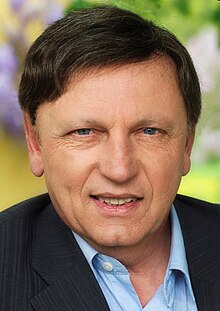
Antoine Waechter (born 11 February 1949) is a French politician, leader of the Independent Ecological Movement.

Antoine Waechter (born 11 February 1949) is a French politician, leader of the Independent Ecological Movement.
Antoine Waechter was born on 11 February 1949 in Mulhouse, (Haut-Rhin). He began activism early, and by 1965 had found the Mulhouse chapter of the Young Friends of Animals. His doctoral dissertation at Louis Pasteur University in Strasbourg focused on "ethology and ecology of the Beech Marten." [1] In the late 1960s and 1970s, he fought for the preservation of wildlife and natural areas across France, such as reintroducing beavers in Alsace and arguing against road construction or industrial sites in and around Vanoise National Park. He became regional president and then secretary general of the Alsace Federation within the Regional Association for the Protection of Nature (which was the regional branch of the French Federation of Humane Societies of Nature and Environment, now called France Nature Environment).
Joined by Solange Fernex and Henri Jenn in 1973, Waechter participated in the beginnings of one of the first environmental political movements in France: Ecology and Survival (Écologie et Survie). He was also a member of the Ecological Movement founded in after the 1974 presidential candidacy of René Dumont. Beginning with their inception in 1984, Waechter was one of four national spokespeople for the Greens.
Waechter was the face of the l'écologie n'est pas à marier campaign that helped his followers win a majority in the general meeting of the Greens in 1986. This movement within the Greens reaffirmed the strict autonomy as well as ideological and electoral independence following entreaties by the "left of the left" led by Yves Cochet. Because of this intra-party support, Waechter was one of the most influential figures in the Green Party until his departure in 1994. He was also the Green candidate in the presidential election of 1988, receiving 3.78% of the vote in the first round, ranking behind André Lajoinie (French Communist Party) and before Pierre Juquin (splinter of the French Communist Party).
In March 1989 he became a municipal councillor in Mulhouse. At the same time, Waechter's 1988 campaign manager, Jean-Louis Vidal, became the first Green elected in Paris, illustrating the Greens were viable in major cities. Three months later, in June 1989, the list Waechter led for European elections obtained 10.8% of the vote (1,922,945 votes) and 9 seats, the best result ever obtained by the Greens in EP elections until 2009. He then became a Member of the European Parliament (MEP). In March 1992, the Greens and Ecology Generation (led by Brice Lalonde) each obtained about 7% of the vote, and Waechter became a councillor in the Alsace Regional Council.
During the 1993 general meeting of the Greens in Lille, Dominique Voynet, who was the spokesperson of opposition, defeated Waechter for the leadership of the Greens. In Lille and under the leadership of Voynet, the Greens decided to negotiate electoral alliances during the first round of the presidential election exclusively with the Left. It marked the end for the theory of Ni Ni, which argued that the Greens could align themselves with one side or the other depending on the offers made. This change of strategy, and the ensuing tensions within the movement, led to the departure of Waechter from the Greens. He then founded the Independent Ecological Movement (Mouvement Ecologiste Indépendant - MEI) in 1994, which hoped to replace the Greens as the major Green party. However, due to the Green's electoral deals with larger parties, MEI failed to garner more than a few hundred supporters. MEI claimed to be purely ecologist, and neither on the left or right. The next year, Waechter failed to win enough endorsements to be a candidate in the 1995 French presidential election.
After leaving the Greens, Waechter practically disappeared from the French political scene for years. He attempted to be a candidate in every presidential election since 1995, but never obtained the required signatures of elected officials. (The MEI eventually chose author and TV reporter Nicolas Hulot as its candidate in 2007, however Hulot withdrew after five of the 12 candidates in the French Presidential election signed the "Pacte Ecologique", affirming that ecological problems would be the key in all the future decisions concerning every political subject. [2] ) By virtue of the sheer number of Green supporters and elected representatives, the Greens have maintained the political visibility MEI has never been able to obtain. During Waechter's participation in the Green's journées d'été in August 2003, the French press openly wondered whether he would rejoin the movement he had left nine years earlier. Later, in 2005, Waechter came out in favor of a yes vote on the Treaty establishing a Constitution for Europe referendum, whereas the majority of MEI voted no in an internal referendum. He replaced his opponents in the National Council, which brought a slew of departures of members and officials, some of whom rejoined the Greens and attended public meetings organized by the right.
Nevertheless, Waechter remained politically visible in the Alsace region, where the MEI list he led in the 2004 regional elections passed the 5% threshold. This showing by MEI was made possible because no list was put forward by the Greens, who had integrated themselves with the Socialist Party list. As for the European elections of 2009, after negotiations with Europe Écologie did not offer Waechter the head of its list in the Centre region, he joined the Independent Ecological Alliance (Alliance écologiste indépendante - AEI), under the movement La France en Action. In the end, AEI earned 3.63% of the votes cast nationally, while Europe Écologie won 16.28%. In November 2009, Waechter announced that MEI would rejoin Europe Écologie in Alsace for the 2010 regional elections. Second on the list in the Haut-Rhin area behind spokeswoman of the Greens Djamila Sonzogni, Waechter was elected in the second round after agreeing to a merger with Socialist Party list. [3]

The Greens was a centre-left to left-wing green-ecologist political party in France. The Greens had been in existence since 1984, but their spiritual roots could be traced as far back as René Dumont's candidacy for the presidency in 1974. On 13 November 2010, The Greens merged with Europe Ecology to become Europe Ecology – The Greens.

Alain Lipietz is a French engineer, economist and politician, a former Member of the European Parliament, and a member of the French Green Party. He has, however, been suspended from the party since 25 March 2014 and is an elected local politician in Val de Bièvre, Paris, France.

Nicolas Jacques André Hulot is a French journalist and environmental activist. He is the founder and honorary president of the Nicolas Hulot Foundation, an environmental group established in 1990.

Ecology Generation is one of the four green parties in France, along with Europe Ecology – The Greens, the Independent Ecological Movement, and Cap Écologie. Founded in 1990 by Brice Lalonde, Environment Minister, upon the suggestion of President François Mitterrand, it describes itself as a club with cross-party alliances of green-minded politicians and public servants. It moved away from the "presidential majority" in 1992, when Brice Lalonde left the cabinet.
The Independent Ecological Movement is a political party in France founded by Antoine Waechter, former presidential candidate of The Greens in 1994. The MEI hoped to replace the Greens as the major green party, but due to the Green's electoral deals with larger parties, it failed to do so. They claim to be purely ecologist, and neither on the left or right. Waechter failed to win enough endorsements to be a candidate in the 1995 French presidential election. The party ran candidates in the 2004 regional elections and in the 2004 European Parliament election in France and were able to prevent the Greens from gaining more seats, such as in the Eastern EU parliamentary region where the MEI's 3% were enough to prevent the Greens from taking 2 seats there instead of one.
The Citizenship, Action, Participation for the 21st Century was a minor green liberal political party in France, founded by Corinne Lepage in 1996 as a political reflection club.

Eva Joly is a Norwegian-born French juge d'instruction (magistrate) and politician for Europe Écologie–The Greens. She represented that party as a candidate for the presidency of France in the 2012 elections. She also served as a Member of the European Parliament from 2009 until 2019.

The Federation of Green Parties of Africa is an umbrella body of the various national Green parties and environmental parties in Africa. The formal coalition, the African Greens Federation (AGF) formed in 2010 at a conference in Kampala, Uganda. As part of the Global Greens, founded in 2001 in Canberra, Australia, the parties included in the Federation of Green Parties of Africa follow the Global Greens Charter. The organization's permanent administration is in Ouagadougou, the capital of Burkina Faso, where the predominant green organization is the Rassemblement Des Ecologistes du Burkina Faso. These parties tend to, but not always, be left-leaning and often do not have widespread support in their respective countries.
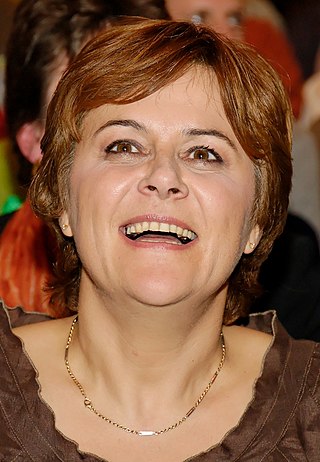
Dominique Voynet is a French politician who is a member of Europe Écologie–The Greens. She is the former mayor of Montreuil and was a French senator for the département of Seine-Saint-Denis.
The Gauche Plurielle was a left-wing coalition in France, composed of the Socialist Party, the French Communist Party, the Greens, the Left Radical Party, and the Citizens' Movement. Succeeding Alain Juppé's conservative government, the Plural Left governed France from 1997 to 2002. It was another case of cohabitation between rival parties at the head of the state and of the government. Following the failure of the left in the 2002 legislative election, it was replaced by another conservative government, this time headed by Jean-Pierre Raffarin.
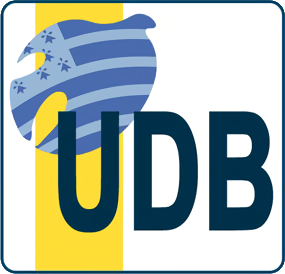
Breton Democratic Union is a Breton nationalist, autonomist, and regionalist political party in Brittany and Loire-Atlantique. The UDB advocates devolution for Brittany as well as the promotion of its regional languages and its associated culture.

François Henri Goullet de Rugy is a French politician who served as President of the National Assembly from 2017 to 2018 and Minister of Ecological and Solidary Transition from 2018 to 2019.
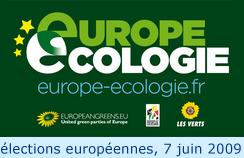
Europe Ecology was a green electoral coalition of political parties in France created for the 2009 European elections composed of The Greens and other ecologists and regionalists. For the European Parliament election in 2014, this electoral alliance was renewed.

The Independent Ecological Alliance was a French electoral coalition originally created to participate in the 2009 European elections composed of the Independent Ecological Movement, Ecology Generation, and France in Action.

Jacques Fernique is a French politician and a member of Europe Écologie–The Greens.

Europe Ecology – The Greens is a centre-left to left-wing green political party in France. The party is a member of the European Green Party. The party was formed on 13 November 2010 from the merger of The Greens and Europe Ecology.
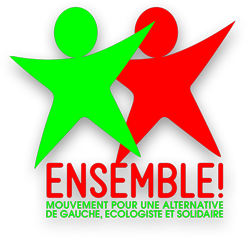
Ensemble!, officially Ensemble – Movement for a Leftist, Ecologist, and Solidary Alternative, is a French left-wing political party, defining itself as anti-capitalist, anti-racist, feminist and eco-socialist. It was launched in November 2013 by several smaller groupings.

Matthieu Orphelin is a French politician who served as a member of the French National Assembly from 2017 to 2022, representing Maine-et-Loire.

Cap Ecology is a French political party created on 27 February 2021, resulting from the merger of Cap21 and the Independent Ecological Alliance (AEI).
The Ecologists (formerly Ecologist Pole is a French green political coalition launched in August 2020. This alliance follows the municipal elections of 2020, where several large cities are won by lists led by ecologists.